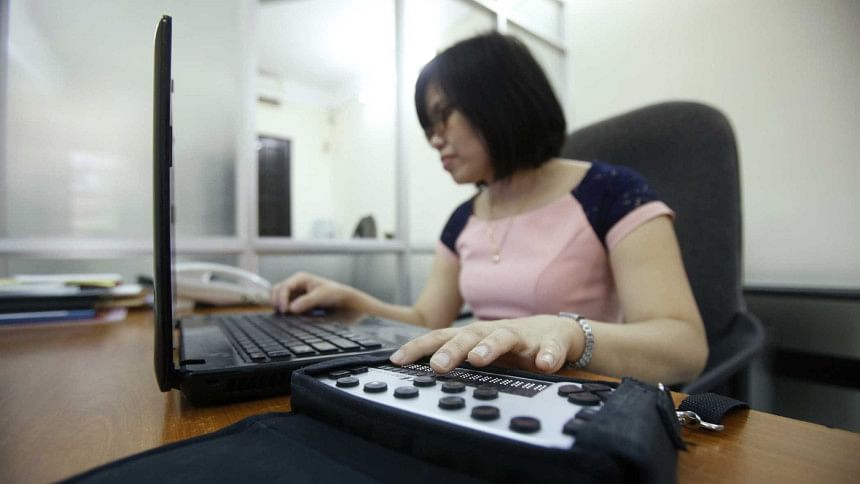Make the post-Covid world more inclusive for people with disabilities

The theme of the International Day of Persons with Disabilities this year is "Leadership and participation of persons with disabilities toward an inclusive, accessible and sustainable post-Covid-19 world." The inclusion of individuals with disabilities in all spheres of society and development is mandated by law. When we successfully do so, we recognise and respect the rights of people with disabilities as equal citizens. Similarly, when we fail to do so, we deny those very same rights. These rights are enshrined in the Rights and Protection of Persons with Disabilities Act, 2013, which is aligned with the UN Convention on Rights of the Persons with Disabilities, which Bangladesh has ratified. This is a shift from an antiquated welfare, charity or purely medical approach to a progressive social and rights-based model. As we await the end of Covid-19, it is worth reflecting on what we expect from the post-pandemic world in terms of work.
The recent global shift to remote work due to the pandemic presents a big opportunity for people with certain types of disabilities—it can be an enabler for people with mobility impairment or those who face inaccessible transportation and infrastructure. This type of flexibility with work can significantly support employees with disabilities—and ideally it makes employers open to offering other enabling flexibilities. However, at the same time, it must be ensured that the progress in establishing greater accessibility to transportation, infrastructure and other facilities for people with disabilities remains on track.
The dependence on technology for remote work has further made clear the great digital divide. Those with devices, reliable internet connections and adequate digital literacy have been able to continue working during lockdowns, but those who did not have access to those tools were left behind. In the face of the 4th Industrial Revolution, the need for digital solutions for our day-to-day life will grow more prominent. Technology can become a great equaliser if accessibility and inclusion can be ensured—otherwise it can further widen the existing divide.
So how do we build a world that is more inclusive, accessible and sustainable? From the perspective of employment, it begins with a shift in mindset. We must recognise that to become inclusive as employers, merely hiring a few people with disabilities is not enough. Rather, it is about building a holistic, enabling environment and ensuring that in an organisation, team members are onboard with disability inclusion and equipped with the necessary tools and capacity to meaningfully include people with disabilities and ensure their active participation.
The other key word in this year's theme is leadership. There is a saying in the community of people with disabilities that there should be "nothing about us, without us." It indicates the need to ensure that people with disabilities are central in the process of designing solutions or programmes that are for them. We must ensure that there is a pathway for people with disabilities to take up leadership roles—not only on issues that affect them, but on mainstream issues as well.
To build an accessible world, we need the Bangladesh National Building Code, which has provisions for accessibility, to be strictly enforced. In developed countries, one often sees that people with disabilities are prioritised in public transport and infrastructure, whereas in Bangladesh, they are often unnecessarily harassed and discriminated against (e.g. being charged extra for having a wheelchair). In addition to the government's efforts, the private sector must also ensure that all the infrastructures they are building or using are accessible to people with disabilities. Development partners can also consider mandating this in all new infrastructure projects that they are financing. Soft infrastructure such as information, training modules, websites, public announcements, etc also need to be made accessible. Support from specialist organisations may be availed to facilitate this.
Then comes the issue of sustainability of these initiatives. This is where policy needs to be put into practice. Many skills development programmes funded by development partners have targets for including people with disabilities as trainees. These targets need to be met, not only by ensuring that enough people with disabilities get access to these programmes, but also by focusing on the necessary provisions to ensure that an enabling and accommodative environment is created, and that there is sufficient budget allocation to see these programmes through in the long term. Simultaneously, as the supply side grows, so must the demand side. A greater number of employers need to come forward to offer opportunities to skilled, qualified and experienced people with disabilities. Gender-sensitive approaches must also be considered as women with disabilities face a number of additional barriers.
As we continue to build capacity and our labour market matures, more types of disabilities must also be progressively addressed. All this and much more can only be achieved through collective multi-sectoral effort. We invite all interested organisations to join and engage with the Bangladesh Business and Disability Network, a non-profit trust established by Bangladesh Employers' Federation, to realise this vision of establishing a disability-inclusive workforce in Bangladesh.
Salahuddin Kasem Khan is chairman of AK Khan and Company Ltd, and former president of Bangladesh Employers' Federation.

 For all latest news, follow The Daily Star's Google News channel.
For all latest news, follow The Daily Star's Google News channel. 



Comments